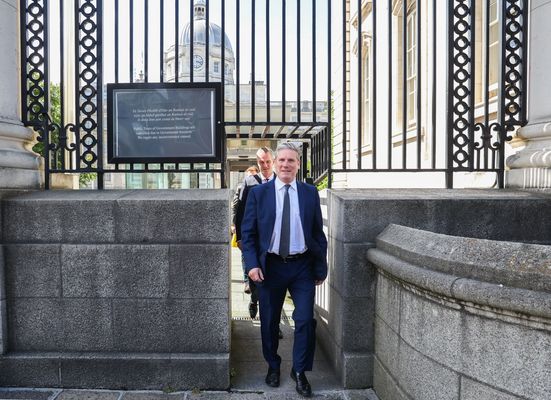Last week saw the publication of yet another research report looking at north/south comparisons. Funded by the Department of the Taoiseach’s Shared Island Unit, the Economic and Social Research Institute examined education and training in what is – astonishingly – “the first study to systematically compare the systems from primary to tertiary levels”.
Among other things, the ESRI finds that early school leaving is two to three times higher in the North compared to the South and this gap has widened over time. It also finds “marked differences in educational attainment between Ireland and Northern Ireland, with a lower proportion of the population in Ireland having the lowest levels of educational attainment”. As for North/South interaction and cooperation, the links are “ad hoc in nature and based on individual relationships or specific projects and initiatives, thus making sustained co-operation more challenging”.
Such research is one example of the growing body of resources looking at north/south comparisons and the issues raised by discussions of Irish unity. Ireland’s Future, for example, has published seven reports, the latest of which is on ‘Rights, Citizenship and Identity in a United Ireland’.
Writing this morning on the vexed issue of the economics of United Ireland !! Dangerous waters😉 pic.twitter.com/yys83HHCHb
— David McWilliams (@davidmcw) May 15, 2016
Or if you prefer listening to reading, and are struck down with Covid, you can spend a week tuning into the Shared Island podcasts. There are now 71 to get through, covering a huge range of contributors and opinions, including Belfast Media’s own columnist the Rev Karen Sethuraman. The Shared Island site carries a couple of dozen written blogs, one of which is by another Belfast Media regular, Gerry Adams.
Less prominent is the academic research which normally hides behind a paywall of subscription journals, accessible only within universities. But the Royal Irish Academy’s ARINS project – Analysing and Researching Ireland North and South – has made academic research available for free through the journal Irish Studies in International Affairs (ISIA).
Recent contributors to the journal include Brice Dickson looking at human rights in a united Ireland and Vicky Conway tackling 'Police Governance, Oversight and Accountability in a United Ireland'. Such work takes us way beyond vague speculation about the possibilities of unity and right to the heart of the practicalities of law and policing.
Those opposed to unity always talk up the size of the North’s subvention from Britain, closing down the discussion with: “The South can’t afford the North.” They are wrong about this as recent work on the economics of unity has shown.
In a similar pragmatic vein, ISIA published a piece on ‘Social Security in a Unified Ireland’ (by yours truly) a couple of weeks ago. Social security is important for three main reasons. First, it affects everyone at some point in their lives. Almost half the population North and South is in direct receipt of a social security benefit at any one time, and many more, typically those with middle to high incomes, are in receipt of ‘fiscal welfare’ — the benefit that comes in the form of tax relief on, for example, healthcare costs or occupational pension contributions. Across Ireland at the moment, one million people receive a state pension and 1.5 million children are supported through Child Benefit.
Secondly, social security is the biggest single area of public expenditure and within the social security budget, pensions form the largest slice – around 40 per cent of the total north and south. The future funding of pensions is therefore a significant issue in any unity scenario.
FIGHT AGAINST POVERTY
Thirdly, social security policy is one of the keys to social justice and the fight against poverty and destitution. Income poverty rates in the North have been consistently above those in the South over the past decade. This is mainly because disposable income inequality in the South is lower and benefit levels are higher. Child Benefit in the South, for example, is worth about 1.4 times what it is in the north for one child, 1.7 times for two children and 1.8 times for three.
The starting point for the Social Security article is that northerners would be integrated into the South’s tax and benefits systems. ‘Unity’ is taken to mean a single regime for taxation and benefits on the grounds that even in the most federal and devolved countries, there is centralised control of major taxes, social insurance and benefit rates. Such integration presents some major challenges, not least of which is cost. The article produces figures suggesting that the cost of integration and levelling up of benefits may not be as troublesome as many fear.
Those opposed to unity always talk up the size of the North’s subvention from Britain, closing down the discussion with: “The South can’t afford the North.” They are wrong about this as recent work on the economics of unity has shown. Again, ISIA is the place to go for this research, whether we are talking about Bergin and McGuinness’s work on 'Who is Better off? Measuring Cross-border Differences in Living Standards, Opportunities and Quality of Life on the Island of Ireland' (2021), or Doyle’s analysis of 'Why the ‘Subvention’ does not Matter: Northern Ireland and the All-Ireland Economy' (2021). Much to some people’s annoyance, Doyle’s work featured in a piece by the BBC’s Dublin correspondent Shane Harrison a couple of weeks ago.
The subvention is, of course, not just a consequence of what is spent; it is also about what is taxed. So we need to start working out what taxes would be raised from the North under the Irish as opposed to the British tax code, including social insurance. To cut a long set of calculations short, more would be raised through the Irish PAYE system, mainly because of higher income tax for the top third of earners and slightly higher social insurance contributions from employers of low paid workers. Overall, two-thirds of individual workers would be slightly better off (up to €20 per week).
There is no reason why the Shared Island Unit, and related initiatives, cannot be open about planning for the constitutional future.
— Colin Harvey (@cjhumanrights) March 3, 2021
A United Ireland will be a shared island.
In a previous column (15th February 2022) I argued that under the Convention on Social Security 2019 – an international agreement between the Irish and British governments – Britain has agreed to honour historic national insurance records of northern workers and existing pension entitlements of those retiring in the South. Some have argued that Britain would not continue to pay existing pensioners in the event of unity, potentially opening up a blatant inequality between British pensioners living in Ireland before and after unity. They suggest that Scotland sets a precedent, given what was said at the time of the independence referendum about responsibility for pensions transferring to the Scottish government (although it appears that nothing was agreed with the Treasury in advance of the referendum). Scottish unionists have used this to pile in on SNP MP Ian Blackford’s recent interview claiming otherwise.
There will be an 'obligation' on the UK Government to pay the pensions of Scots after independence, @Ianblackford_MP insists.
— Representing Border (@ITVBorderRB) February 3, 2022
SNP Westminster leader is adamant paying National Insurance means 'a right to a UK pension, no ifs and no buts'.
Full interview: https://t.co/qYcszuWW83 pic.twitter.com/jvz0ZjWeCl
But the situation for Ireland is very different as there is a treaty between the Irish and British governments on this issue which explicitly recognises historic entitlements, even if the Convention is ‘denounced’. Ultimately, this is a political matter and no doubt pensions liabilities will be on the table in unity financial negotiations; and no doubt some within the British government will not think twice about breaking yet another international agreement. But the planning assumption should be that the law is honoured.








